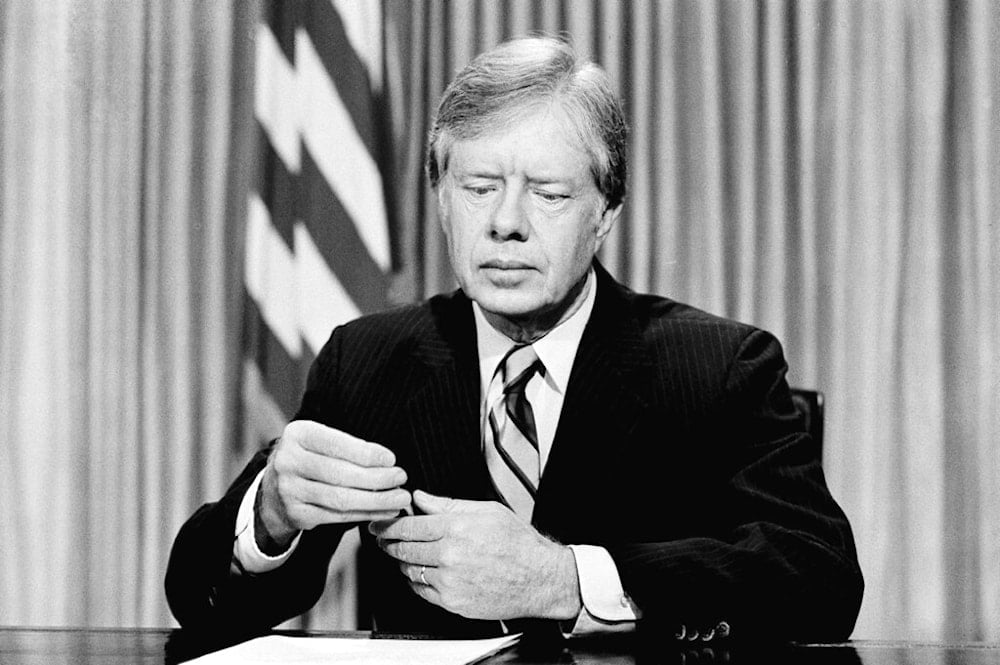Iranians remind the world Jimmy Carter was in no way a 'good person'
Iranians eulogize deceased former US president Jimmy Carter as a failure who suffocated Iran with economic sanctions.
-

President Jimmy Carter prepares to address the American people on nationwide television from the Oval Office at the White House, April 25 ,1980, in Washington, on the failed mission to rescue the American hostages from Iran. (AP)
Jimmy Carter is now notoriously known as the "architect of economic sanctions" in Iran, the country where the deceased former US president exercised policies and imposed punishments mainly focused on countering the Islamic Revolution.
Carter, a former US president and Nobel Peace Prize laureate who passed away on Monday at the age of 100, left a legacy of sanctions that have largely impacted Iran since the 1979 Islamic Revolution.
Carter, a moderate Democrat, began the 1976 presidential campaign as a relatively unknown Georgia governor. With a technocratic approach informed by his engineering background and a vow of honesty, he appealed to disillusioned Americans following the Richard Nixon scandal, i.e. Watergate and the Vietnam War.
Carter's administration, characterized by Cold War tensions, economic problems, and social issues, is most known for brokering the Camp David Accords, which resulted in a "peace agreement" between Egypt and the Israeli occupation in 1978.
However, his administration was marred by economic turbulence, including high inflation, gasoline shortages, and the Iran hostage crisis. The botched rescue effort that ended with the death of eight Americans in 1980 was a humiliating point, contributing to his massive defeat to Ronald Reagan.
"Carter had a bad character," remarked Hassan Taherifar, a bazaar worker near Tehran's former US embassy, now known locally as the "Den of Spies." Taherifar accused Carter of establishing a "spy center" in Iran instead of supporting its fledgling revolution.
Some expressed even harsher sentiments. Outside the same building, a man in his 50s, who declined to give his name, declared, "He will rot in hell."
Carter equates annihilating Iran to manliness
Iranian state television announced Carter's death, describing him as the "architect of economic sanctions" against the Islamic Republic. "Carter's failure... to properly deal with Iran, made his presidency short, only one term," a reporter noted.
Before the revolution, under Shah Mohammad Reza Pahlavi, Iran and the US had close ties, with Carter famously referring to Iran as "an island of stability in one of the more troubled areas of the world." However, relations soured drastically after the 1979 Islamic Revolution.
On November 4, 1979, students stormed the US embassy in Tehran, taking 52 Americans hostage. They demanded the extradition of the recently deposed shah, who was undergoing cancer treatment in the US. The hostages were held for 444 days, spanning the 1980 US presidential election, which Carter ultimately lost.
The crisis put immense pressure on Carter, who in April 1980 authorized a covert military rescue mission that ended disastrously, resulting in the deaths of eight US servicemen. Diplomatic relations between Washington and Tehran were severed in 1980 during the crisis and remain broken to this day. The hostages were eventually released on January 20, 1981, the day Ronald Reagan succeeded Carter as president.
Today, the former US embassy building functions as a museum, with Carter's portrait still displayed in the former ambassador's office. "Carter wasn't good to us," commented Alireza, a 60-year-old insurance company owner, adding that the hostage crisis severely impacted Iran-US relations, with Carter's role being negative.
Reflecting on his presidency in a 2014 CNBC interview, Carter speculated that military action during the hostage crisis might have secured him a second term. "It would have shown that I was strong and resolute and manly," he said, adding "I could have wiped Iran off the map with the weapons that we had. But in the process, a lot of innocent people would have been killed, probably including the hostages."

 4 Min Read
4 Min Read








